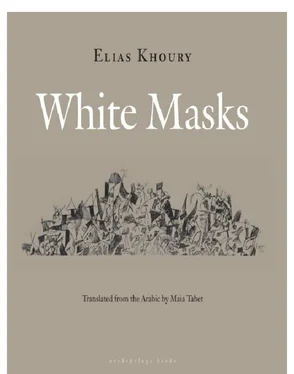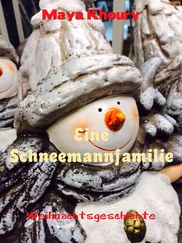Fatimah loved looking at the picture of the woman with the Christ child, and those eyes of hers… she’d hung it above her bed in the tiny room they’d given her in that huge house, sometimes she’d talk to it, and when Sitt Huda caught her once, she smiled. Fatimah knew the little icon wouldn’t answer, but such a sweet little infant he was, she dreamed of having one like him and of cradling him in her arms like Our Lady Mary. .
Except that Mahmud threw it away. It disappeared with him one day. He said there was no need for Our Lady Mary or for this picture anymore and started cursing. Fatimah was sure the Virgin was going to abandon her, she told him as much when he tried to snatch the picture from her hands. Fatimah wept, she told him the Virgin was walking away, she was leaving the picture, walking out of it — still tiny like in the picture, a miniature Virgin in orange hues holding the sleeping infant in her arms, turning this way and that, with Fatimah walking by her side. But Mahmud just swore and snatched the picture away. Fatimah felt sure they were all going to suffer some terrible misfortune. She thought of getting a new one but Sitt Huda was so far away. Mahmud said that Fadee had become like “them” — he wants us dead, he told her.
Fatimah knows neither how nor where, but somehow this man resembles the picture, even though he doesn’t at all. She leaves him and goes back to her room while he sets off, slowly talking as he walks, addressing everyone that passes him, talking to people he doesn’t know. No one answers him and she wonders why the man is doing this to himself.
“What kind of a city is this?”
Mahmud Fakhro stands alone in front of the heavy metal door. . The streets are deserted, they’ve simply emptied, there’s nothing left but sandbags and distant gunfire… shattered glass of every color is scattered across the asphalt, and the remains of gutted cars look like corpses strewn along the street. There’s not a living soul around. Mahmud ponders what he’s doing here, but thinks maybe he’d better stay on. . true, the militiamen have taken a lot, but there’s still so much left. He needs to make ends meet and how else to do it? He’s got the gun, which provides some protection. They gave it to him finally, after he’d talked himself hoarse arguing with them. Yes, the building is quite empty now, but there’s still a lot to be found in it.
So Mahmud Fakhro stays on over there, where’s there nothing but the street, the remains of the shelling, and his solitude. When he goes up to the third floor, which he moved into after the gunmen left, and opens the fridge, it smells. There’s no electricity. It’s as though he were the only living being in a city of specters and ghosts.
It was on that street that he met her. He wasn’t looking or anything, she happened to walk by one day. When he first saw her, making her way alone down the street, he thought she was a pretty woman. Although she must have seen him squatting in the broken glass in front of the building, she didn’t turn to look his way. She just kept going, while he followed her with his eyes.
No, she wasn’t pretty, and she didn’t take the slightest notice of him. And what was she doing there alone anyhow? On an impulse, Mahmud jumped to his feet and started to follow her. Her footsteps rang down the deserted street, and he walked behind her, but she didn’t turn around. Then, she veered off to the right, entering a narrow alley that stank of burnt paint. Or so he thought. She reached a metal gate, opened it, and was about to go in, when she turned and looked at him. He thought she was going to say something, at any rate that’s what her lips suggested, so he smiled and said hello. The word slipped out so quietly that most likely the woman didn’t hear it. At any rate, she didn’t answer, and then slowly turned and entered the building.
Realizing he was all alone again, Mahmud left. But the woman remained on his mind.
Sitting alone in front of his building, fondling the pistol grip, he kept thinking about going back there and up those stairs. . What could she do to him, a woman by herself? But he didn’t go. He was afraid there’d be other men in her household, or that she might have some disease. And he didn’t see her again after that.
Alone on the deserted street, Mahmud occasionally sought the company of the fighters and went with them on forays to the old downtown souqs. But mostly he spent his time sitting in front of the building.
“I’m not scared,” he’d tell the gunmen. “I’m on your side, honestly, but I can’t leave the building.”
The thing is he didn’t want to die. Dying was serious business, as far as he was concerned. He didn’t understand how those young men went to their deaths so easily. Dying was no easy matter, he thought. So he sat there, alone.
And then he saw her again. He was sitting on the steps in front of the building, eating canned beef, bread, and a tomato, when he saw her coming down the street all by herself. She was walking slowly.
“Please join me,” Mahmud said.
She thanked him and continued on her way. No, not exactly — she slowed her pace, so he repeated his invitation. She halted and turned toward him, and leaned against the iron railing between the street and the steps where he sat.
She asked him what he was eating. “Meat,” he said, his mouth full. And then again, “Please join me.” Entering the perimeter of the building, she told him she didn’t eat canned meat, and stood there as he carried on chewing. Looking at her, Mahmud noted the tattoos, like rings, around her eyes. She’s pretty, he thought, and asked her what her name was.
“Bahiyya,” she replied. “Bahiyya Agha.”
“Pleased to meet you… Mahmud Fakhro.”
“ Ahlan wa sahlan. ”
He asked her what she was doing in this deserted neighborhood. She told him she worked as a maid for Mr. Ahmad Rustom.
“They went to France, and I am here by myself, watching the house for them.”
“But it’s dangerous here, it’s a war zone.”
She told him she placed her trust in God, and that her sons visited her from time to time. When he inquired further about them, she recounted that her husband had died of a heart attack three years earlier and that her sons worked as laborers on construction sites. She told him she felt scared living on this street all by herself and that she’d better be on her way.
Mahmud wasn’t sure what to do but he didn’t stop her. The days passed. She didn’t return, nor did Mahmud dare try to visit her.
One rainy morning, Mahmud Fakhro woke up early with a bitter taste in his throat. At first he thought he’d go home and visit Fatimah and the children. But then he quickly changed his mind. He stretched, had something to drink, and ate an orange, singing some old tunes from his childhood. Then he shaved, dressed, and went out.
He walked down the deserted street, turned off to the right and stopped in front of her building. He pushed open the wrought-iron gate, noting its loud squeak, and slowly padded up the stairs. He wondered what floor she lived on. Reaching the first-floor landing, he found an open door. When he went in, there was nothing there — the apartment was completely empty, not a stick of furniture in it, nothing but the floors and graffiti on the walls. So he hurried up to the second floor, where he came to a closed door. He knocked, no one answered, so he went on to the third floor. There, an acrid smell wafted out to the landing from an open door, so he continued on and reached a closed door. He knocked once, and then again. He heard a commotion inside and then a woman’s voice: “Who’s there?”
“It’s me, Mahmud.”
It was her voice, he was sure she would open the door. He stood there expectantly, but the voice disappeared and the door didn’t open. He knocked again and again, but still the door didn’t open. Mahmud felt humiliated… he’d been rejected. She didn’t want to let him in. But then the door opened a crack, framing her face. She asked him what he wanted.
Читать дальше












